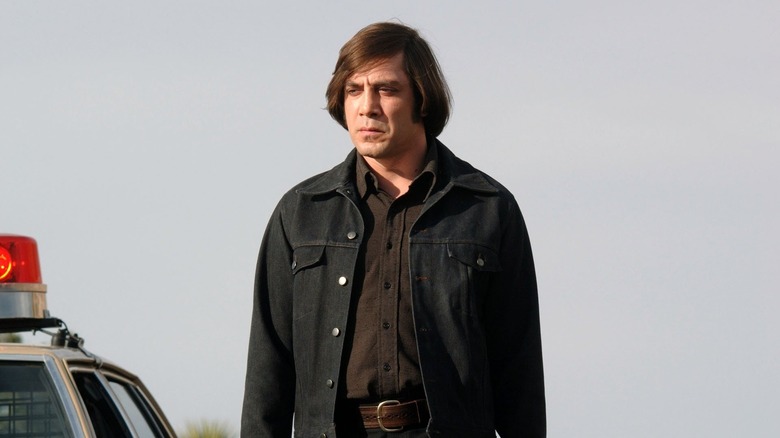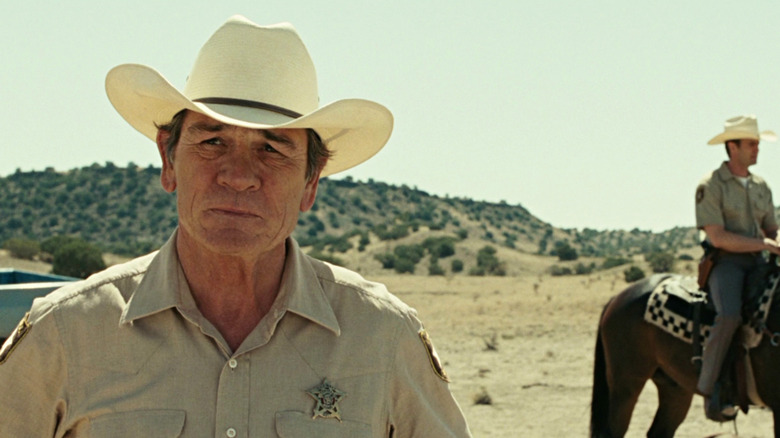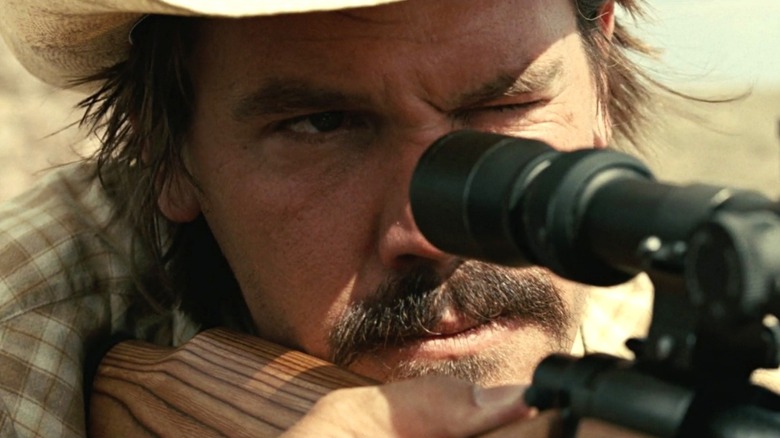How No Country For Old Men Landed In The Coen Brothers' Lap
Throughout their career, the Coen Brothers have excelled at writing verbose characters and snappy dialogue. You have the screwball back-and-forth in "The Hudsucker Proxy," John Goodman's folksy salesman in "Barton Fink," and Frances McDormand's overbearing gossip in "Raising Arizona," to name just a few examples. There are exceptions, of course. Billy Bob Thornton's smalltown barber in "The Man Who Wasn't There" did more smoking than talking, but generally their quieter characters are there to provide a counterpoint to the chatterboxes around them.
From their debut "Blood Simple" onwards, the Brothers have almost exclusively written their own screenplays, building their distinctive style from the ground up. Yet as original as their films are, literature often has a heavy influence on many of their works and how the characters communicate. Classic crime fiction is one of their staples, with "Miller's Crossing" paying homage to Dashiell Hammett, "The Big Lebowski" playing like a stoner version of Raymond Chandler's "The Big Sleep," and "The Man Who Wasn't There" serving as their ode to James M. Cain.
Switching from noir to neo-Western, "No Country For Old Men" tackled one of the big guns: Pulitzer Prize-winning Cormac McCarthy. It is one of their least chatty films to date, set in a world where men are of few words and the narrative unfolds with long, almost wordless stretches. Paring back the dialogue and resisting their usual outlandish side-plots and storytelling tangents, it was a streamlined stone-cold thriller that won them three Oscars: Best Picture, Director, and Adapted Screenplay. Not a bad haul for a story that almost literally fell in their laps.
So what happens in No Country For Old Men again?
1980, Texas: a deputy sheriff arrests hired killer Anton Chigurh (Javier Bardem) and takes him back to the station, which turns out to be a big mistake. The hitman strangles the hapless law enforcer with his cuffs and makes his escape. He then murders a hapless motorist with his weapon of choice, a captive bolt pistol, and steals his car.
Meanwhile, out on the wide open plains, Llewelyn Moss (Josh Brolin) is hunting when he comes across the bloody aftermath of a drug deal gone badly south. Everyone's dead apart from a badly wounded survivor begging for water, whom Moss ignores as he tracks down the last man standing. The trail leads to another corpse slumped under a tree with a satchel containing $2 million.
Feeling guilty about leaving a man to die, Moss returns later that night with water. The guy is dead. A truck arrives at the scene and Moss narrowly escapes, sending his wife to stay at her mother's for safety and holing up in a motel.
Chigurh is the man hired to recover the money, relentlessly hunting Moss down. Also on the case is Sheriff Bell (Tommy Lee Jones), an old-school lawman feeling his age and lamenting the senseless violence he sees around him on a daily basis. Can he reach Moss before Chigurh does?
The Coens love a good story about greedy people fighting over a bag of cash, and it has proven very fruitful for them. "Fargo" was another Best Picture nominee and "The Big Lebowski" became a stoner classic that inspired its own pseudo-religion, Dudeism. "No Country For Old Men" is the least funny of the three, with a world-weary pessimism and terseness of language that stays true to McCarthy's source novel.
How the Coens came to adapt McCarthy
In an interview, the Coens said they regard "No Country For Old Men" as their first adaptation and that, if they had to start somewhere, "why not start with the best?" The project came out of the blue, as Joel explained:
We didn't actually choose it. It was sent to us by Scott Rudin in galleys about a year before it was published... and we had each read a number of [McCarthy's] novels before just for pleasure. This one seemed unlike his other novels... at a certain level it's much pulpier than his other novels, at least it is initially, the first three quarters move along like a thriller. And then it takes a turn which just got us more interested.
Bleak, pitiless, and featuring a relentless killer on the trail of Brolin's brusque protagonist, "No Country For Old Men" was their darkest film since "Blood Simple." While Bardem grabbed much of the attention for his chilling performance as Chigurh, the film is also a showcase for how controlled the Coens can be when they relinquish their trademark quirks. Personally, it leaves me a little cold; I appreciate its qualities but it is the top-tier Coen Brothers joint that I revisit the least. I feel like I got everything I needed from it on the first pass, unlike "Fargo" or "The Big Lebowski," which I only grew to love after a few viewings.
Nevertheless, "No Country For Old Men" was a triumphant return to form after two of the worst films of their career, "Intolerable Cruelty" and "The Ladykillers," both of which featured typically loquacious characters. As those three shiny golden statuettes proved, sometimes actions speak far louder than words.


